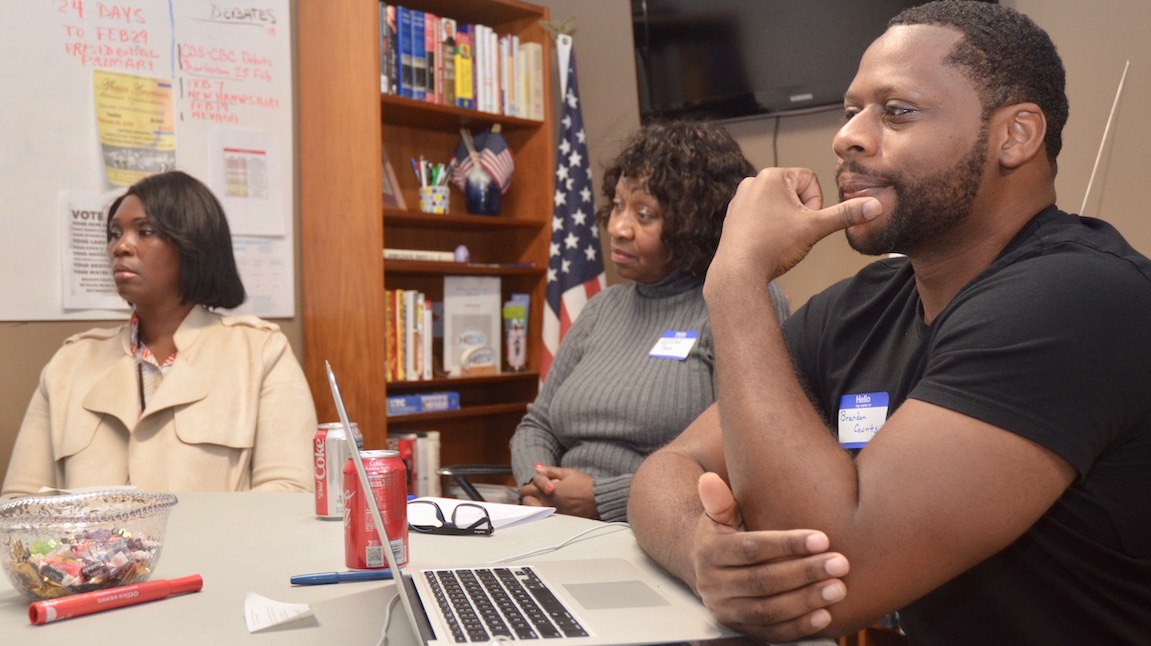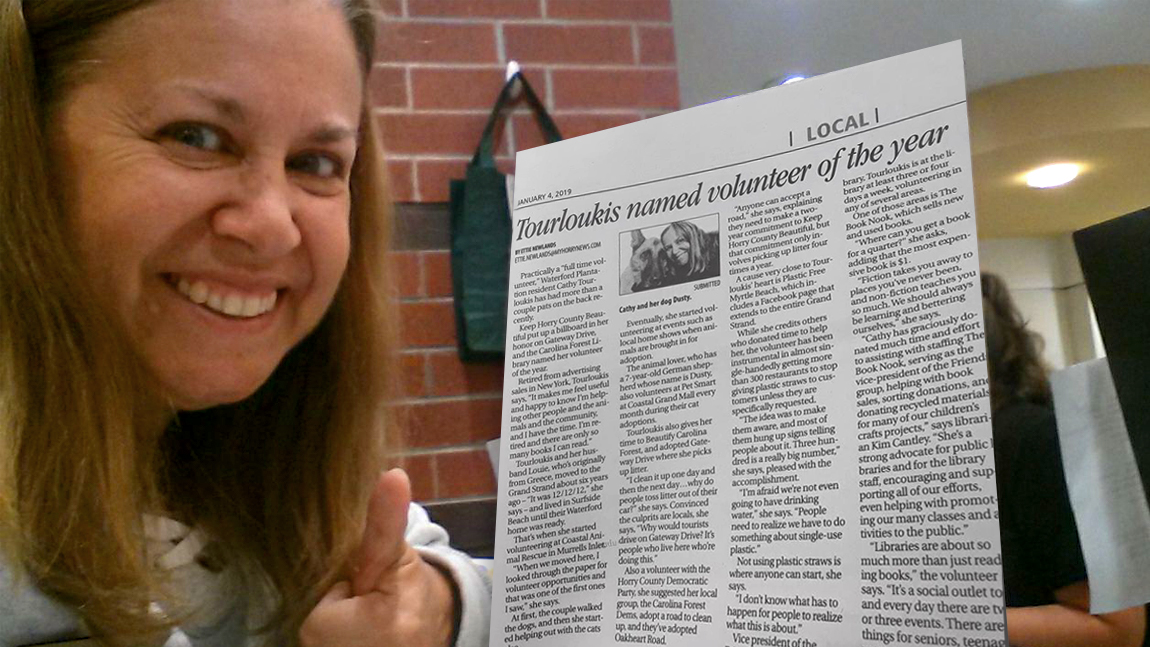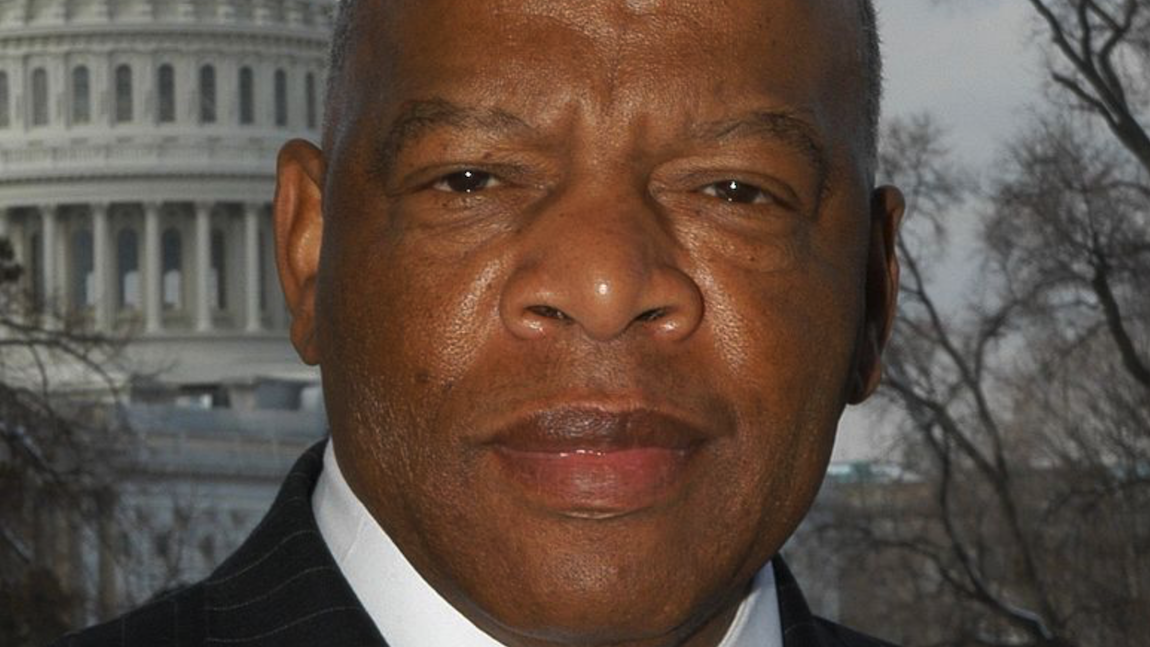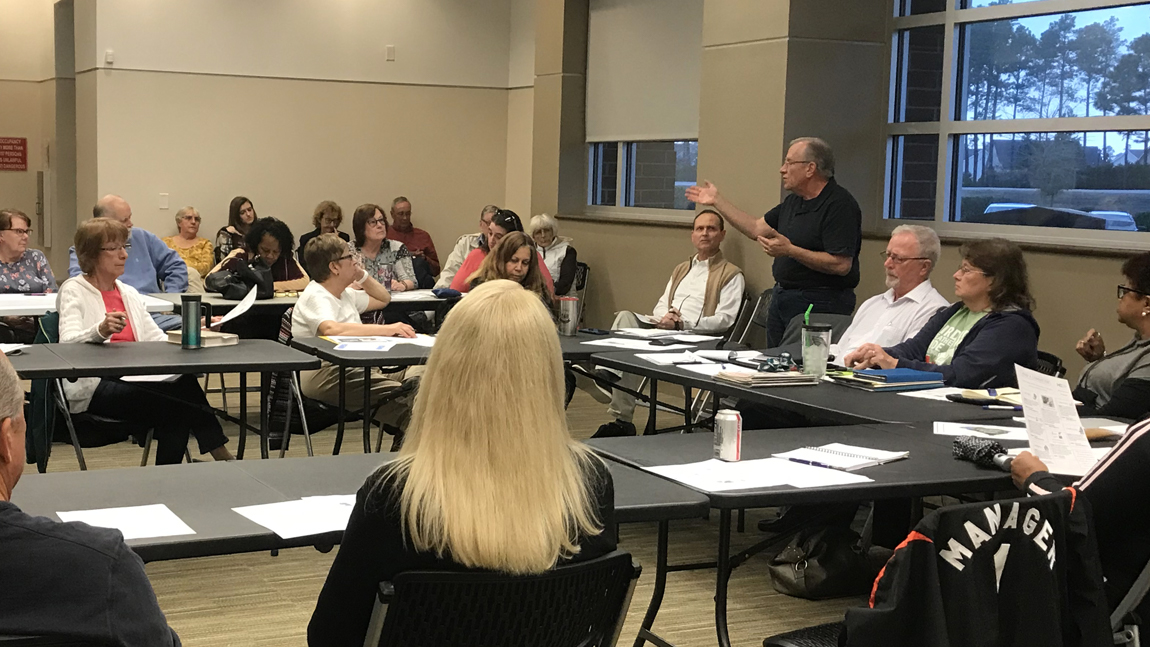Above Photo: Shakedra Jenerette, Alester Linton-Pryor and Brandon Counts
By V. Susan Hutchinson
Editor’s Note: On February 5 a small group of African American community activists and leaders came together at the Horry County Democratic Party Office (HCDP) in Conway for an open discussion on issues affecting African Americans.
This is the 3rd in a series of four articles about the Forum. Links to the other articles are at the end of the article.
A video representing the complete discussion is available here. This article is taken from the comments in the video from 1:12:34 to 1:30:17.
For the list of participants please see HORRY DEMOCRATS HOST AFRICAN AMERICAN ISSUES FORUM.
The Educational System
The unfair and disproportionate approach to educating and disciplining black students in Horry County public schools compared to white students was an important part of the Forum discussion, led by Dameion Fowler.
In addition, Fowler said, there is a serious lack of black teachers in Horry County, which also has a negative effect on black students.
He opened the discussion on education with these questions: “What is the reasoning behind how our young, black students are being treated in the school system and what solutions can we provide, or push forward to solve that?” and “How do we get more black teachers into the school system?”
Shakedra Jenerette expressed the opinion that, in general, there isn’t a lack of black teachers applying for positions, it is more of an issue involving those responsible for hiring teachers. Jenerette, a single parent of five, said that when it comes to disciplinary issues, “parents need to be more involved and more informed.”
Most Horry County teachers view black children differently from others, she said, adding that she has seen incidents where children get upset, and the reaction from the teacher is fear if the child is black, while another child, who is not black, gets “coddled”.
Jenerette said she continues to be baffled by this discrepancy in the reaction of teachers who “see this kid as a threat and this kid as needing sympathy, when they both were having the same type of issues.”
As a speaker, especially at events with women, she encourages white women to teach their children to not see black children as a threat. Jenerette said staying silent equals complicity, and that these changes in perception must begin with each individual.
Jenerette also said when she was a child, unlike today, her pastor would come to the school if she got into trouble to check on her.
“I don’t see the community gathering around our children to ensure they are being treated fairly,” she said, adding that more of that traditional community involvement is needed for the situation to improve. Most people change, she said, “because they are uncomfortable,” not out of the goodness of their heart. Active community involvement would make teachers, principles and the school board uncomfortable enough to make changes, Jenerette contended.
Pastor Dixon said part of the problem is “cultures and ethnicities not understanding other cultures and ethnicities.”
Principles and school board members are technically qualified, but lack the understanding of the various student populations to draft policies and procedures that are fair to everyone, he said, using PTSD in children as an example. That, said Dixon, is more prevalent in urban areas where gun violence, drugs and domestic violence is common. Educators who have never been exposed to this type of environment will see a child, whose actions in the classroom are a result of PTSD, as one who needs discipline instead of soothing and comfort. Dixon added that school for these children “is a refuge” from their stressful home environment.
Regarding the lack of black teachers, Dixon said that although there needs to be changes in the methods to recruit black teachers, “We can’t get to the black teachers until we raise up black teachers.”
And, to get black children interested, schools need to teach black history, he said, noting that current textbooks have little content on black history, so black students do not get exposed enough to their own history. This omission of a complete black history at a young age subconsciously teaches black children that there is a bias between races that they carry with them into adulthood.
Dixon said that prioritization of white history means black students do not learn about anyone they can identify with, which impacts their young egos and can ultimately lead to self-esteem issues later in life.
History, he stressed, should tell the truth and include the real facts, good and bad, about events and people then “… let the children as they get older decide if they want to be racially biased,” he asserted. Making changes to eliminate subliminal teachings of bias will help open up doors for equality and career opportunities, Dixon said.
Verlene DeWitt, a former educator, said the zero-tolerance policy practiced by Horry County schools does not work and a more positive environment would be more beneficial. Instead, DeWitt says, schools need more counselors to work with students and have sessions with classrooms or the entire school to “teach about a positive school environment, how to diffuse situations, how to eliminate bullying…which helps at risk students.”
DeWitt iterated that teachers need to learn how to properly diffuse situations in their classrooms. Knowing how to “diffuse kids” results in less disciplinary action, she said.
Regarding the lack of black teachers, DeWitt said, “That starts in high school, in elementary and middle school. Train people with the idea that it is OK to be an educator.” In addition, she said, the low wages for teachers is a deterrent to choosing education as a career, while increasing the pay to be more competitive with other professions would go a long way toward attracting young black children to teaching.
Brandon Counts observed that the racial make up of the school board is not representative of the district they represent. He said we need to motivate people in these communities to run for school board and get elected to try to implement the changes needed to better educate black children and address current disciplinary practices.
Fowler said it isn’t enough to have black representation on the school board; school board members must be vehement about making change, rather than just being silent.
DeWitt pointed out that although the school board is considered non-partisan, there is a clear distinction on which candidate leans toward the Republican Party. As an example, in District 1 where a seat was recently open, although several of the candidates were Democratic-leaning with experience in education, another Republican was selected. DeWitt said it is a challenge to get people on the school board who represent Democratic values.
Counts countered by saying that as an elected position, District 1 should not have just appointed someone; the replacement should have been elected. He sees this as a fault of the Democratic party for not standing up and pushing back to let the people decide.
The Racial Wealth Gap
Fowler moved on to the topics of economics and employment. He read statistics that say nearly one of four black South Carolinians live in poverty, with a child poverty rate of 22.3 percent. The median net worth of white households in S.C. is $133,683, while for black households it’s $14,413.
Other statistics from various organizations show that “The average black family in the U.S. would need 228 years to build the wealth of a white family today,” he said.
Fowler then asked, “What do we need to do to close the racial wealth gap? Specifically, in South Carolina, but, in general, all over the nation?”
Pastor Dixon said we need “A miracle.”
Dixon equated chronic poverty to slavery and said wealthy Americans are “trying their best to make sure they stay wealthy and those that are not stay in slavery.”
One way to address this, he stressed, is to elect politicians who will “level the playing field and fight on behalf of the people.”
However, there are many variables to achieve this goal, Dixon said, adding that the minimum wage needs to be significantly increased to $22 or $23 per hour, “but $15 an hour is a good starting point.”
Alester Linton-Pryor stressed that young blacks need to learn financial responsibility. Understanding how to create a budget and making sure the bills are paid must be a priority over anything else, she said.
Counts said African Americans should “start looking at what’s the next boom,” as the tech industry is currently. “Are we focused on teaching our children how to use technology, how to design things so they are creating the next Facebook or the next Amazon?” he asked.
Counts asked if we are providing tech industry jobs where African Americans can work at a higher rate of pay. Educating children for future big industries will lead to the creation of wealth, he said.
To Be Continued…
The final article Horry County African American Issues Forum: Reparations and Black Class Differences, as well as the first 2 articles Horry County African American Issues Forum: The Age of Trump and Horry County African American Issues Forum: Voting the Black Agenda can be found on the HCDP website.






